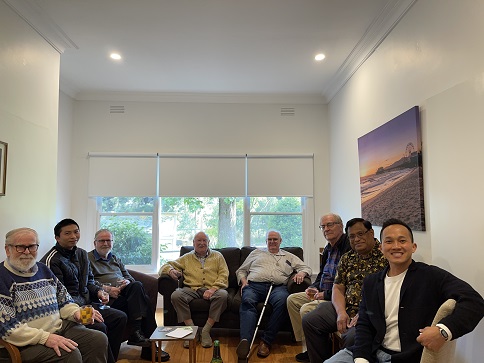Peter MALONE
Space Jame: a New Legacy
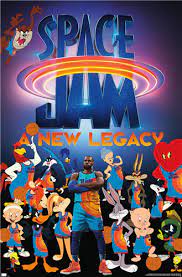
SPACE JAM: A NEW LEGACY
US, 2021, 115 minutes, Colour.
Le Bron James, Don Cheadle, Cedric Joe, Khris Davis, Ernie Johnson, Lil Rel Howery – and Bugs Bunny, Elmer Fund, Lola Bunny, Roadrunner, Wiley E. Coyote T, Porky Pig, Tweety Bird, Granny…
Directed by Malcolm D.Lee.
Once upon a time, in 1996 to be precise, young audiences around the world were exhilarated by a basketball film featuring then hero, Michael Jordan, in a basketball match – with a team made up of the well-known and beloved characters from Loony Tunes. And, in succeeding years, it was watched over and over again, fostering happy memories, wonderful childhood memories. Children who were 10 at the time of the film’s release are now in their mid-30s! What will they think of a new, more elaborate retelling of this story? And, will the now 10-year-olds treasure this version in the way that their parents did?
This is quite an exuberant show. It runs for almost 2 hours, 30 minutes or so more than the original. And, the basketball star for the present is Le Bron James (who has had an extra career beyond sport in movie and television production). There is a joke throughout the basketball match when some of the Toons call for Michael Jordan and popular actor, Michael B.Jordan turns up (and is rejected). We see the young Bron being urged by his basketball father to concentrate, give himself to the game.
And then, in the present, Bron has his own family, pressurising his young son, Dom, to go to basketball camp, somewhat severe in his discipline, overlooking Dom’s talent in creating, at age 12, his own computer game, and wanting to go to a camp for digital experts. Bron’s wife urges him to be a more caring and understanding father.
Off they go to Warner Brothers, Burbank, and go into the digital archives. Little do they know, but we know, that there is a dastardly character there, Al G. Rithm, yes algorithm, played with some sinister chuckles by Don Cheadle, who feels that his digital talents have been overlooked and who wants to achieve some kind of immortality, controlling the super service at Warners, and eliminating the Loony Tunes characters!
Long story short, most of the action is a basketball match, like the first film, all in the digital world, Bron sometimes himself, sometimes an animated character, having the Toons in his team, against Al G. Rithm’s giants and monsters – and, fans behind him from so many of the Warner Brothers films like Robin Hood, The Mask, Batman and Robin, a cameo by King Kong (and a wild -looking nun who looks as if she has strayed from The Devil’s). Al G.ithm has invited Dom into his team – and the only way Bron can get him back is to defeat Al G’s team.
Parents and children will enjoy all the shenanigans of the familiar characters, led, of course, by a lively Bugs Bunny, with Elmer Fudd, Wiley E. Coyote, the Road runner, the little pig – and Lola Bunny, voiced by Zendaya. And, there is also Gan, fond of a cocktail but, when she goes into action twirling on her walking frame, look out.
Defeated moments, triumphant moments, some cheating on the part of the enemy, morale boosting talks, and, of course, Dom appreciating his father, his father coming to appreciate his son – and, urging him to be himself and taking him to a weekend camp, not the basketball but the digital!
So, sports action, sports heroes, plenty to entertain younger audiences from the digital age, and, even after all these decades, the Loony Tunes still making us laugh.
Rose Maker, The/ La Fine Fleur
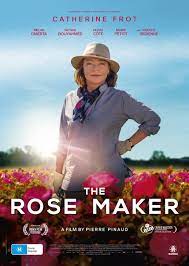
THE ROSE MAKER/ LA FINE FLEUR
France, 2020, 95 minutes, Colour.
Catherine Frot, Manel Foulgoc, Fatsah Bouyahmed, Olivia Cote, Marie Petiot, Vincent Dedienne.
Directed by Pierre Pinaud.
A must for Gardeners Anonymous! A delight for those gardeners who are not anonymous! And for those, like this reviewer, who are not gardeners at all, a very pleasant entertainment.
There is something about the status of the rose amongst all the flowers of creation. There is beauty, there is colour, there are the colours and blends, there are petals and shapes… And, they are certainly to the forefront in this story of the cultivation of roses, the creation of beautiful hybrids, fields of roses, greenhouses specialties, and the drama of exhibitions and competitions.
In the 2019 film, Perfumes, there was an emphasis on the wonders of scents – and a rather prim expert and her dependence on her chauffeur. Perfumes could be something of a cousin to The Rose Maker.
However, there is nothing prim about the characters here. Actually, they are rather rough diamonds, emphasis on diamond emerging from the rough. Again, the central character is a middle-aged woman, Eve (Catherine Frot), no husband, no children, only the heritage from her beloved father of cultivating roses. And she has a devoted assistant, Vera (actress-writer Olivia Cote), who has really sacrificed herself to try to keep the Rose cultivation market financially afloat.
There is a villain of the piece, a rose entrepreneur, who is in it for the business side, the prestige at continually winning competitions, relying on his assistants for their creativity in producing a new rose year by year. He has his eye on Eve’s business and would like to buy her out. He offers a position for her to work for him.
But Vera makes contact with a company who place workers who are looking for jobs. So, three different types arrive to work in the fields and the greenhouses, a 50-year-old man who is certainly looking for security, a young woman who is rather slow but delights in creativity in the roses, a young man, surly, abandoned by his parents when he was a child, in and out of jail for burglary.
We know they are going to bond – and the young man is going to discover that he has expert olfactory abilities, knows his scents and is able to remember the details.
However, Eve does rely on them for a bit of their criminal talent in order to upstage the entrepreneur.
So, delight in looking at the roses, the process of hybridisation (now there’s a word to add to vocabulary!), the changes over the seasons of the year (including a dramatic hailstorm), ingenuity to go out into the market to sell roses to boost the finances.
We hope that all will work out well – and it is quite a pleasing experience to watch the roses in this company. And some wonderful close-ups of the flowers during the final credits.
- Title? The French title and application of flowers? The more straightforward English title?
- The setting, towns outside Paris, the vast feels for the roses, the holding of the competitions, the interiors, the home, offices? The musical score?
- Audience response to the flowers, to the roses, beauty, colour, shapes, displays in the greenhouses, out in the fields, the entries in the competition? The cultivation of the roses over the seasons, Eve and her diary an indication of the development of the roses? The moods of the seasons, the young assistant overheating the greenhouse and destroying the blooms, the hailstorm?
- The theme of creating the roses, seen at the competition, the entries, Eve and her hopes, the entrepreneur and his victory, successive victories? His running a business, the staff creating the roses, his taking the credit? The contrast with Eve, inheriting the business from her father, giving her life to it, no husband or children, ageing, the talent for hybridisation? Her explaining and illustrating the whole process from the bud, the seeds, the development of the flowers? Successes and failures?
- Vera, devoted, the finances, loss of sales, the entrepreneur wanting to take over, or to have Eve work for him? Vera and her personality? Making contact with the employment agency? The three workers, Eve and the initial reaction, taking them on? Training them, but their observing her, working in the grounds?
- The three workers and their personalities, the older man, in need of work, ethnic background, wanting a contract, yet still caught up in the flowers? The young girl, slow on the uptake, the incident with heating the greenhouse, her working in the fields, the experiments, tending the roses? Fred, his age, in prison, robbery and violence, many times, on parole, his background story, his parents abandoning him, yet his wanting contact, trying to find them, eventually going to meet his mother, her reaction, put him off, eventually his going to the house, speaking bluntly to his parents and leaving?
- The entrepreneur, his special rose, Eve and her scheme, employing the workers, the plan to go in and steal the rose, the tensions, the melodrama, success, Fred and the two possibilities? Eve and her demonstrating the hybridisation?
- The group, the contract, enjoying the work, learning more about roses? The financial issue, the decision to go out and sell the various pots of roses, in the market, the deals with the gamblers and drinkers taking roses home? At the cemetery, playing the music?
- Finance, Vera and her hard work, the bank, borrowing money, finance from the sales, Vera’s contribution? The failure, Eve and her negotiations with the entrepreneur, having the documents ready, Eve beginning to sign them?
- The young woman, finding the hybrid rose, hurrying to tell the others, to stop Eve selling?
- The cultivation of the new rose, the support of the group, the competition, Eve’s speech?
- Happy ending, and small in private enterprise versus corporatisation?
Concrete Cowboy
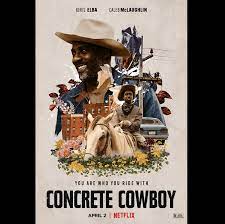
CONCRETE COWBOY
US, 2020, 111 minutes, Colour.
Idris Elba, Caleb McLaughlin, Lorraine Toussaint, Method Man, Jharrell Jerome, Byron Bowers, Ivannah-Mercedes, Jamil Prattis.
Directed by Ricky Staub.
The title from the original novel is Ghetto Cowboy. And, the story is based on actual characters, on Fletcher Street in North Philadelphia, a group of mainly African-American men and women who care for horses and train them. Hence the concrete cowboys.
As a social document, the film is quite interesting in showing the life of the various characters, the comparatively poor neighbourhood in which they work, park lands for the horses, stables, various sequences for care of the horses, training them, riding them, races. And, it emerges that some of the central characters in the film are actually ghetto cowboys playing variations on their own life stories.
However, this is also a film about family, and, especially, about father-son relationships.
The story focuses on a teenage young man, Cole, played very effectively by Caleb McLaughlin. His parents are separated, he is living with his mother, causing trouble, being expelled from school, her becoming desperate and bringing him to Philadelphia to stay with his estranged father, played by a Idris Elba.
The father is quite casual in his relationship with his son, the son wanting to run away but his father making demands of him if he stays in his house (where there is also a horse in residence!). As we might expect, the young man is rebellious and meets up with friends who are involved in drug dealing, guns and violence, pursued by the police. But, while he is asked to do the most menial of tasks in the stable, one of the ghetto cowboys, confined to a wheelchair, takes him under his wing, training him to ride, even later facing a challenge to tame one of the wilder horses.
So, a coming-of-age story, but one that is very difficult, in strange circumstances, but illustrating that the possibility of reconciliation between father and son, of the father opening up to the relationship, of the son desperately needing a father-figure.
Local government also intervenes at various times, critical of the stables, wanting the area to be made available for development – and the concrete cowboys at the end have to move on and find another place to live in care for the horses.
- Title? The novel’s title, Ghetto Cowboy? Cowboy tradition, Fletcher Street in Philadelphia? Based on actual characters, real characters participating in the film?
- The opening in Detroit, the trip to Pennsylvania? Fletcher Street, the stables, the grass, the horses exercising, the abandoned warehouses, homes? Police precincts? The musical score?
- Cole’s story, living with his mother, love for her, his father’s absence, trouble in school, suspended, his mother’s decision, taking him to his father? Leaving him with his bags? His age, experience, inexperience? His father’s reaction, Nessie and her comments and help? Wandering, looking for shelter? Going back to the stables?
- Cole and his friend with Smush? The past, real acquaintance? Smush and his world, petty criminals, connections, dangers? Out on the town with Cale? The influence? The meeting with the gangsters? Smush and his dreams, his boots, plans for buying a property? The rendezvous, the shooting? His funeral, the group riding to the funeral, the boots? An alternate for Cale?
- Cole, taken to the stables, apprehensive about horses, his father having the horse in the house? Clearing the stables, Paris and his advice, the wheelbarrow? The beginning of Cole’s discipline? His living in the house, with his father, feeling of alienation?
- The important scene of his packing his bag, his father stopping him, Cole thinking his father hated him, his father playing the John Coltrane record, Cole and his name, the music, Coltrane making good? The bonding between father and son?
- The role of the police, his friendship with Harp? On the scene of the shooting? Talking things through? The roundup of the horses? Harp and Cole with their mask, in the stables, his helping them, the ride to the grave? Moving on?
- The Fletcher Street members, Nessie, owner, wise, the advice, care? Paris, his disability, friendship with Cole, cleaning the stables? In his chair, on the horse, writing? Esha, her age, friendship with Cole, helping him, moments of romance, the gift of the cowboy hat?
- The horse free on the field, the group making a ring, the challenge to Cole, his taming the horse, riding it, later standing on the saddle?
- The group, the rounding up of the horses, the police, the public officer? The protests? The group having to move on to find another place? The final information that Philadelphia was turning it into apartments?
- Cole, his mother’s arrival, reunited with Harp? The family, moving on?
- The unusual subject, true story, the characters, horses? But a coming-of-age story, father and son bonding?
News Spots around the MSC world, Fiji, US, Vietnam – and some locals.
News Spots around the MSC world, Fiji, US, Vietnam – and some locals.

Fiji, Pacific Islands Province
Fr Simon Mani MSC celebrated his 25th Anniversary of his Ordination to Priesthood at Sacred Heart House on Tuesday, 30th November 2021, Feast of St Andrew, Apostle and Martyr. MSC Confreres and MSC Laity of the Chevalier Family joined him in thanksgiving at a Eucharistic celebration. He expressed his sincere gratitude to all confreres, family and friends who became part of his journey as an MSC Priest. He recalled the 25 years as a life of sorrow and joy, and above all a call to follow Christ who is the source of inspiration to serve and to love.
Simon also recalled his appointments since his ordination to priesthood. He was ordained by Archbishop Petero Mataca together with Fr Daniel Shaw and the late Fr Lu Collins at the Sacred Heart Cathedral in Suva.
- First Vows 25th Jan 1991: Novitiate, Manoku Abemama in Kiribati
- Ordination to Priesthood: 30th November 1996
- St Agnes Parish
- MSC PU Assistant Superior
- MSC PU Superior
- CTC Director
- Pacific Regional Seminary Rector
US
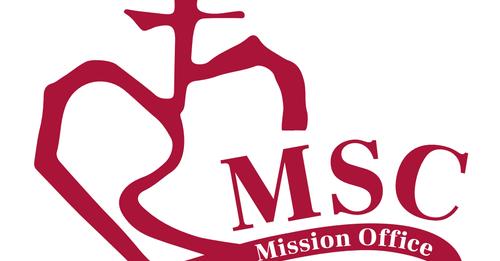
- We are working with our MSC Australian Province to promote the Mission Office. We USA MSC will soon inaugurate or own Mission Office. Keep watch!
Vietnam
- Hoàng Huy Nguyen, the superior of the MSC community in Vietnam, is pleased to report that after such a long period of lockdown they were able to gather.

- On 1st Dec during a eucharistic celebration Vũ and Thành Lê were admitted to the ministry of Lector and Thành Vũ and Dưỡng were admitted to the ministry of Acolyte.

- Quang, said that Hoàng’s homily focussed on charity and holiness. Xin chúc mừng & Chúa luôn phù hộ bạn.

PS Foundation Day local celebrations, Blackburn, Henley Beach. Thanks to Ahn, Alo and Kenji.
Blackburn, hosted by Brian Gallagher.
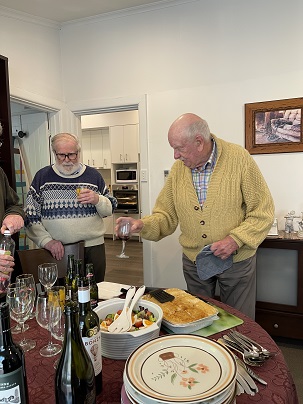
Henley Beach with the OLSH Sisters.
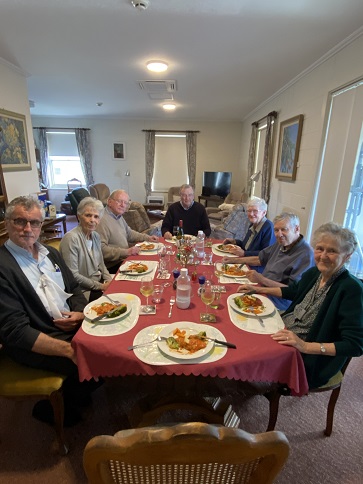
OLSH sisters L to R: Helen Armstrong, Yvonne Gleeson, & Pat Irvin
How I Became a Superhero
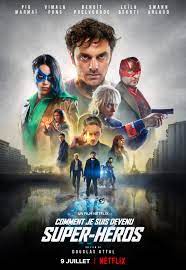
HOW I BECAME A SUPERHERO
France, 2020, 97 minutes, Colour.
Pio Marmai Leila Bekhti. Benoit Poelvoorde, Vimla Pons, Swann Arlaud, Clovis Cornillac.
Directed by Douglas Attal.
This is something of a small version, variation on the X-Men themes. The story presupposes that some humans have special powers which they exercise for good or for evil but that they live alongside ordinary humans in ordinary society.
It is based on a French novel but there have been similar stories from the United States, especially Powers.
There is an eccentric group of upholders of the law with special powers, the Pack Royal. However, one of their members is killed in action, another develops Parkinson’s, and a third goes into athletic training. There is some comedy as well as action in the characters, especially veteran actor, Benoit Poelvoorde, as Henri, Monte Carlo, who lives in retirement.
However, the main character is Moreau, a police officer, seemingly slack, 10 years of not living up to expectations, called into a case by his superior officers. He is slack, arrives late, intervenes in cases, can find solutions – but is made to have a partner, Schaltzmann, Vimla Pons, who is efficient but has much to learn from Moreau.
The basic situation is that there is an arch criminal who has a squad stealing the special powers and the agencies that they use – especially for throwing flames, for arson. Later in the film his back story is revealed, his parents concerned about him and his powers, his being deprived and treated by a psychologist, his wanting his powers back, assembling a group of thugs who go around accosting, destroying, but especially abducting the daughter of one of the Pack Royal, keeping her in his power, wanting to gain her powers.
So, quite a lot of police routines even in this exotic situation.
Ultimately, it is revealed that Moreau himself has the special powers, blames himself for the death of the Pack Royal action man who was killed, but now decides to become active to get his daughter back. Which means then a mixture of police action and detection, along with all kinds of flames and superpower activity.
Compared with such extravaganzas as the X-Men films, this is a rather more subdued Parisien action story.
Craft, The: Legacy
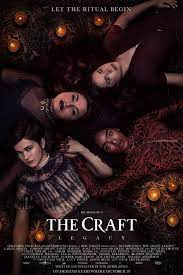
THE CRAFT: LEGACY
US, 2020, 97 minutes, Colour.
Cailee Spaeny, Zoe Luna, Gideon Adlon, Lovie Simon, David Duchovny, Michelle Monaghan, Nicholas Galitzine, Fairuza Balk.
Directed by Zoe Lister-Jones.
The Craft was a popular film for younger audiences in the mid-1990s, focusing on witchcraft in the suburbs.
This is a variation on the plot for a 21st century audience, especially a teenage girls’ audience. Three girls at school read the book, The Craft, and try to re-create the spells but realise that they really need four girls to have some kind of completion, East, West, North, South and the spirits of Earth, Air, Fire and Water. While this relates to more serious and adult themes, especially in horror films, the spells and magic in this story are comparatively low key and very suburban.
The main focus of the story is on a teenage girl and her mother, moving to a new city and home, the mother in a relationship with a father with three sons. With David Duchovny as the father and Michelle Monaghan as the mother, there is an emphasis on some headliners. The daughter, Lily, is played by Cailee Spaeny (who appeared as the murdered girl in Mare of Easttown).
When the new girl is bullied in class, especially when she has her period and is humiliated, the other girls introduce themselves and, of course, a foursome is set up very quickly. And, there are some magic effects – especially a power of changing people’s personalities from antagonistic to friendly. This happens with one of the bullies in class, Timmy (Nicholas Galitzine) who becomes most apologetic and supportive of the girls – and, in a kind of Ouija seance, reveals that he is gay. And that he has an affection for one of David Duchovny’s sons.
David Duchovny, looking puffed up and artificial, goes round the countryside offering affirmation seminars and comes on very strongly to Lily, later apologising. But, he will become the target of the girls and their spells.
In the meantime, Lily discovers that she has been adopted, confronts her mother, gets an explanation that links her back to the original Craft film, and a last-minute revelation that the character played by Fairuza Balk, now in a padded cell, is her mother.
So, a thriller with touches of horror and magic, generally benign witchcraft, is geared for the very young girls’ audience – but will probably seem tame, even lame, to those who prefer their witchcraft more serious and more grisly.
Infamous/ 2020
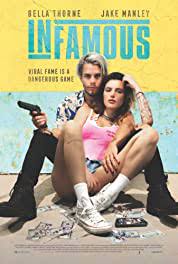
INFAMOUS
US, 2020, 98 minutes, Colour.
Bella Thorne, Jake Manley, Amber Riley.
Directed by Joshua Caldwell.
Audiences will be thinking almost from the start of this film that it is a 21st-century replay of Bonnie and Clyde. But, while Warren Beatty and Faye Dunaway seemed glamorous even in their crimes and their going out in a blaze of gunfire, this couple seems in no way glamorous despite the desire of the central character, Arielle (Bella Thorne) wanting to be the epitome of glamour and fame.
The film focuses on Arielle, at home in Florida, her friends, her mother, her seemingly dead-end life, her being on social media, continually posting, wanting to be famous. She encounters Dean, living with his alcoholic father, on parole.
Arielle is able to persuade Dean to break parole and go off with her to seek fame and fortune, fame through social media, fortune eventually through robberies. And she is filming and posting all the time. Dean, despite his conviction for armed robbery and violence, seems to have the potential to be something better but continually succumbs to Arielle despite his better judgement.
This is particularly the case with Arielle and her gun, their being pulled up by a policeman and her shooting him, the various hold-ups and again, her violence with the gun. She says she has been careful to not show their faces on her social media postings – and, she is absolutely delighted with the number of followers and likes that she continues to accumulate. She seems to be fulfilling her ambitions – but has set the bar particularly low (while she thinks it is very high).
There is an episode when Arielle and Dean need a lift, a passerby stops (a young African- American woman) who then confides that she is an avid follower, some excitement in her lonely life and unfulfilled ambitions after her education, who drives them, accommodates them, covers for them when they pass through a roadblock. And the pathos is that this young woman has achieved something of her ambitions simply by her encounter with Arielle.
Eventually, the police will be closing in on them. And, they get tied up with a group of bank robbers, Arielle and Dean participating in a hold-up. There is a shooting. Arielle is filming. And, the police tracking the social media and turning up outside the bank. Violence and mayhem including the death of Dean.
In the film finishes where it opened, Arielle with her phone, texting and posting, just waiting for the police to arrest her. Fame as notoriety seems to be enough.
The film seems geared to a younger audience who may be in the vein of admiring this social media celebrity. While there is some satire and moral judgement on Arielle, she is a completely unlikeable character, audiences having little or no sympathy for her.
Black Widow/ 2021
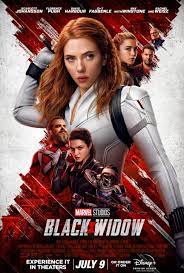
BLACK WIDOW
US, 2021, 134 minutes, Colour.
Scarlett Johansson, Florence Pugh, David Harbour, Rachel Weisz, Ray Winstone, O-T Fagbanle, William Hurt, Olga Kurylenko.
Directed by Cate Shortland.
A check on Scarlett Johansson’s career in film appearances indicates that this is the ninth film to feature her character, Natasha Romanoff/ Black Widow, appearing first in Iron Man 2.
While she has been a presence in all these films, she has tended to be overshadowed by the other characters, the other Avengers, the male Avengers. Now, here she has the opportunity to be herself, a character with personality, not just martial expertise.
As with so many films these days, this is an origin story, situating Natasha Romanoff within the context of her family, her training as an assassin Black Widow, her relationships within the family and their consequences.
So the film opens quietly in Ohio in 1995, a seemingly ideal family, parents, two little girls, devoted, playful… Until the moment arises when it is revealed that they are Russian Sleepers, have to escape, and, in the manner of the Marvel Universe, fly their secret plane, pursued by American government agents, father fending off attack with a machine gun from the wing of the plane, mother wounded, little Natasha flying the plane – to be greeted in Russia by the powerful tycoon, Dreykov, and the little girls taken away to be trained as Black Widows. So, that is the explanation for the Natasha Romanoff, a Black Widow but one who has escaped to the US to become an Avenger.
Scarlett Johansson has an opportunity to be more than just an action hero this time, more of a character, more of a person, taking refuge in Norway (beautiful scenery), persuaded to go to Budapest (beautiful views of the city and the Danube with action and car chases), meeting her long lost sister, Yelena, a strong performance from Florence Pugh, whom we have seen operating as an agent in Morocco (more beautiful scenery).
And just when we might have thought we had seen the last of father and mother (David Harbour and a welcome Rachel Weisz), the daughters rescue their father from prison where head in interned for 20 years (but no love lost), meet their mother and learn the truth about their life in the US.
The main part of the plot and the final action is the families plan to confront the tyrant, Dreykov, and wreak revenge. No spoiler to realise that they do!
One of the difficulties for the film is the casting of Ray Winstone as Dreykov. Ray Winstone has had a career of playing British thugs and heavies, with the consequence that it is very hard to accept him, even wearing spectacles and talking technology, as the 21st century equivalent of Bond villain, Blofeld.
The film was directed by Australian, Cate Shortland, who brings something of a more humane quality to her characters.
The important thing is to sit through the very long credits because, as with Marvel Films, there is an extra sequence indicating the future, very important information given to Yeena (by a surprise appearance by Julia Louis Dreyfus).
- The success of the Marvel universe? The heroic characters? The Avengers?
- Black Widow as one of the Avengers, her appearance in the films, her action, powers, her background? This film providing the origins story, her family background and career?
- The opening, Ohio in 1995, Middle America, home, schools, outings? The contrast with Russia? Locations in Norway, Budapest, Morocco, the isolated town, interiors, the Red Room?
- Action sequences, explosions, chases? Special effects? Stunts? Musical score?
- Ohio, the family, the role of the father, mother at home, the little girls, love for their father, the outings? The father arriving home, having to move, the chase, the police, the plane, the father fending off the attack, mother and the plane, shot, Natasha having to steer the plane, father on the wing? The getaway?
- The contrast with arriving in Russia? The family separation? Dreycov, his authority? His imprisoning the father? Girls taken away, the years of training, the Black Widows? Planted around the world? Dreycov, personality, power, the photographs with all the world leaders? His control of the girls? Mind control? Drugs?
- The episode in Morocco, Yelena, the pursuit of the woman, the drugs, the confrontation? The decision to find Natasha?
- Natasha, the pursuit of the Avengers, Secretary Ross? The meeting with Natasha? Her escape, going to Norway, the refuge, retirement, Mason and his help, provisions? The news about Budapest?
- In Budapest, the encounter with Yeena, the pursuits, the chases, the scenery of the city?
- The sisters, reconciliation? Their lives? Reputations, action, deaths? Natasha and the death of Dreycov’s daughter? The decision about revenge, their father, in prison, bigger, rough, his character? His reputation as the Russian Captain America? His being rescued?
- Father, older, trying to relate to his daughters, the reactions? Hostile? Finding their mother? The pigs, her scientific experiments? The revelation of their role in the United States, the daughters being adopted, the truth about Natasha’s mother and her being killed? The mother and her being the brains in the family? The father slower, last action hero?
- The plan for the attack on Dreycov, his later, elaborate, above the radar, the vast tower, interiors? His personality, cruel, intelligence, controllable? Lack of emotions?
- The attack, the flashbacks explain the plan, Melina disguised as Natasha, vice versa? The confrontation with Dreykov? The appearance of Antonia, disfigured, the presence in the masked warrior? The past confrontations with Natasha, the armour, the shield?
- The Widows, training, the attack, the chemicals, lack of mind control, support of Natasha and Yelena?
- The final destruction, the defeat of Dreycov, the freedom of the Widows, the freedom for the family?
- Ross in pursuit, Norway, the fate of Natasha?
- The epilogue after the credits, you Lena at her sister’s grave, the arrival of the agent, the photo of Natasha’s killer? Sequel?
Pompeii Sin City/ Pompeii Eros e Mito
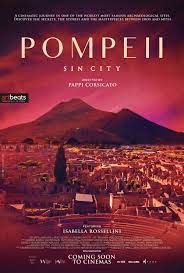
POMPEII – SIN CITY/ POMPEII, EROS E MITO
Italy, 2020, 80 minutes, Colour. Isabella Rossellini, Darius Arya, Andrew Wallace-Hadrlle, Ellen O’Gorman, Catherine Edwards, Massimo Osanna.
Directed by Pappi Corsicato.
Yes, a film with a visit to the ruins of Pompeii but not exactly in the way we might have expected. Interest in and enjoyment of this film will depend on what we had hoped to see. It turns out to be something of a mixture of documentary, travelogue, exploration of the subtitle, Sin City (although the original Italian title does not emphasise sin but rather highlights the relationship between the Myths and Eros), and some contemporary re-enactments of the myths seen on the frescoes that have survived, the reputation of the cities of Pompeeii and Herculanaeum, the eruption of Mount Vesuvius in 79 A.D., the overwhelming of the cities and their populace, but the extraordinary heritage of ruins that have survived more than 1900 years. In fact, there is some explanation but it comes in the last part of the film, a reflection on what has been explored, and a close-up of the mystery of the of the identity of the famous surviving skeletons.
For those who want visuals of Pompeii, walks through the columns, the remains of the homes, viewing the frescoes, and a range of drone views from above as well as a final visit to the barren craters of Vesuvius, plenty to satisfy.
For those who want some experts commenting on Pompeii, Roman civilisation, Roman culture and decadence (plenty of that), there is a range of academics from England and the United States interspersed throughout the film, some appealing, some bit off-putting. But, the main commentary is given to Isabella Rossellini (looking more and sounding more like her mother, Ingrid Bergman, as she grows older), who walks through the city, a distracting green coat, speaking, inviting us in, giving us some winks.
There is a lot (more than a lot) of talk about lust, power, sex, decadence. The emphasis, even from Isabella Rossellini, becomes rather tiresome. But, a lot of points are made about the city, the violence of the gladiators in the arena built in 70 A.D., the decree of the Roman Senate banning combat for 10 years, stories about Nero’s self-aggrandising wife, Poppaea.
But the part that many audiences might say they could do without are the contemporary suggested re-enactments of various Greek and Roman myths from the frescoes, Leda and the Swan, Theseus and Ariadne, Bacchus, the Gladiators… all by very contemporary looking performers in contemporary clothes, some, some evocative, some provocative. On the other hand, some audiences will enjoy their comment on the myths.
So, perhaps best if an audience is prepared to know there is plenty that they might enjoy – and some aspects that they might question.
Dating Amber
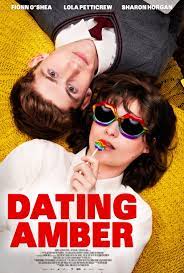
DATING AMBER
Ireland, 2020, 91 minutes, Colour.
Fionn O’Shea, Lola Petticrew, Sharon Horgan, Barry Ward.
Directed by David Freyne.
Dating Amber is in very funny. However, it is also a very serious film in its themes. It is an Irish story but certainly has its universal aspects. We are back in a town near Dublin, a lot of the action taking place at the high school, the focus on students in their final year and the prospects of what happens next.
The setting is 1995. And for audiences who don’t know much about the film and expect romantic comedy from the title, the issues are far more serious. This is a dramatic comedy about adolescents, sexual identity, doubts and fears, the pressures of society and expectations, coming out.
So much has happened in world consciousness about sexual identity in the last quarter of a century, issues becoming much more explicit and discussed, legislation for same-sex marriage, many more films and television series dramatising the issues, it is difficult to go back to realise what was said and done at the end of the 20th century. But, throughout the film, there is the lurking question – how similar is it for students at school in the third decade of the 21st-century? How similar are struggles these days? How much help is available? How much acceptance and support?
Lola Pettigrew is quite dynamic as Amber, acknowledging her identity, putting up with but angry at all the slinging off at school. She lives with her mother, her father dead. Teenage prejudice means that, although she is rather extroverted, she is a loner.
Fionn O’Shea is rather different as Eddie, living at home with his parents, loving mother, wise and supportive younger brother, his military father away for six months of the year but intending to do his best with his sons. It has been lurking in his subconscious, Eddie certainly unwilling to allow it to surface, that he is gay. He denies it. And, like many deniers, he is vocally against gays and indulges in verbal faggot-bashing. And he is extremely gawky in his behaviour with girls.
Audiences will now guess the meaning of the title. Amber and Eddie come to an arrangement, that they will be a couple at school, diverting all the criticisms, even getting some admiration from previous critics, especially those boys whose homophobia is both ignorant and aggressive.
On the one hand, the friendship flourishes – and, in fact, the scenes between the two, their talking, their shared interests, family visits, remind us how valuable friendship is irrespective of sexual orientation.
On the other hand, long-term partnership is doomed. Amber, acknowledging herself, is comfortable in encountering a girlfriend. Eddie, on the other hand, will not admit anything even to Amber, is fearful of being discovered, has a crush on his teacher which he then misinterprets and is shamed. In the meantime, is trying to follow in his father’s footsteps, Army training, a lot of the talk about being a real man.
Whether truth will out for Eddie is a difficult matter. However, the ending reminds us, especially with Amber and her most generous gesture, of how valuable true friendship is.
- The title? Expectations? Romantic comedy? But different?
- The Irish setting? The town, homes, caravans, the school, classrooms…? The real feel for the town? The musical score?
- Issues of sexual identity? Acknowledgement? Secrecy? Fears? Attack and persecution, bullying? Coming out?
- Adolescents, their limited experience, puberty, facing issues of identity, difficulties in coping, peer pressure, expectations? Homophobia?
- The opening, Eddie and his father, military, the voice-over commentary, Ian coming home, his relationship with his wife, with his two sons? Sense of alienation, separation, the effect on the boys> Eddie and his exercise, push-ups, bike riding, military training, the detailed sequences of the training and the demands, physical? His hoping to be enrolled in the college, follow his father’s tradition?
- Amber, living with her mother, her mother wary of teenage pregnancy, having Amber when she was 19? Loving, protective? The discussions about her father?
- Eddie, shy, introverted, knowing subconsciously that he was gay? Unwilling to face it, the full? Wary of criticism? The homophobic bullies at school? His forcing himself to kiss the girl, awkward? His crush on the teacher?
- Amber, criticised, loner, irritated by the attacks? The encounters with Eddie? Coming to the arrangement, the pretence, cuddling in class, the pretend kisses, always together, talking? The boys and girls in the class accepting this, admiring it? Eddie bringing Amber home, the conversation at the meal, awkwardness? In his room, the military posters? (And his mother seeing the sketches and her realising of the sexuality issues?)
- Going into Dublin, enjoying each other’s company? Going to the club, Amber and her set up of renting out the caravan to the couples, being paid in drugs, their taking them? Amber and the encounter with the young woman at the club, comfortable? Eddie, dancing, liberated, the approach by the man, the kiss, his response, seeing the man from Army training, the tension, the fight? The aftermath? Returning home, his parents, Amber’s mother?
- Eddie, the continued training, meeting the man from the club, secrecy? The test, his father saying he did not have to necessarily pass? The result, his acceptance? His decision to go into the Army? His motivations? Yet unhappy?
- The break with Amber, his saying he dumped her? The reaction of the boys and girls? The discussion with teacher, the kiss, his embarrassment of being shamed?
- Amber, with the girlfriend, on the beach, bringing her home, the sexual encounter? Accepting her identity? Yet the friendship with Eddie, the photos, her treasuring them? Eddie leaving them at the caravan door?
- Eddie leaving for the army, Amber throwing the stone, their talk? Amber offering the cash for Eddie to be free and leave? Eddie’s refusal, Amber insisting, his final acceptance and leaving on the train?
- The 1995s, attitudes of the time, changes since then, but issues still current?

